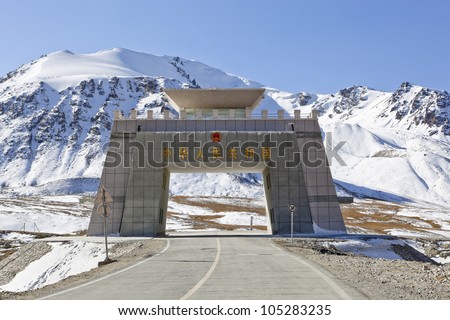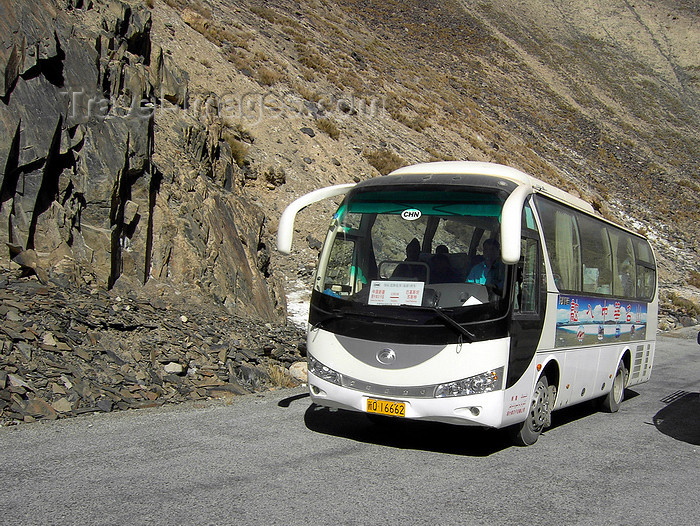Khunjerab Pass
Khunjerab Pass (elevation 4,693 metres or 15,397 feet) is a high mountain pass in the Karakoram Mountains in a strategic position
on the northern border of Pakistan's
Gilgit–Baltistan region within the
region of Jammu and
Kashmir and on the southwest border of the Xinjiang region of China. Its name is derived from Wakhi 'Khun' means Home
and 'Jerav' means spring water/water falling.
The Khunjerab Pass is the highest paved international border crossing in the
world and the highest point on the Karakoram Highway. The roadway across the pass was completed in
1982, and has superseded the unpaved Mintaka and Kilik Passes as the primary passage across the
Karakoram Range.

On the Pakistani side,
the pass is 42 km (26 mi) from the National Park station and checkpoint in Dih,
75 km (47 mi) from the customs and immigration post in Sost, 270 km (170 mi) from Gilgit, and 870 km (540 mi) from Islamabad.
On the Chinese side,
the pass is the southwest terminus of China National Highway 314 (G314)
and is 130 km (81 mi) from Tashkurgan, 420 km (260 mi) from Kashgar and some 1,890 km (1,170 mi) from
Urumqi. The Chinese
port of entry is located 3.5 km (2.2 mi) along the road from the pass in Tashkurgan County.
The long, relatively
flat pass is often snow-covered during the winter season and as a consequence is
generally closed from November 30 to May 1. There is excellent grazing on the
Chinese side of the pass, and domesticated yaks and dzu (a cross between yaks
and cows) may be seen from the road.
In 2007, consultants
were engaged to investigate the construction of a railway through this pass to
connect China with
transport in Pakistani-administered northern areas of Kashmir. A feasibility study started in November 2009
for a line connecting Havelian
750 km (466 mi) away in Pakistan and Kashgar 350 km (217 mi) in Xinjiang.
China is actively involved in the development of Pakistan Railways and for
the past five years it has been increasing its stake in the country's
communication sector. Pakistan Railways is a state-owned company that provides
an important mode of transportation in the furthest corners of the country. It
has been a great integrating force and forms the lifeline of the country by
catering to its needs for large-scale movement of people. The freight-passenger
earnings comprise 50% of the railway's total revenue. Pakistan Railways carries
65 million passengers annually and operates 228 mail, express and passenger
trains daily. It introduced new mail and express trains between major terminals
from 2003 to 2005.
Pakistan Railways has recently entered several agreements with Chinese railway
companies for its development. In 2001, Pakistan Railways signed a $91.89
million contract with China National Machinery Import and Export Corp for the
manufacture of 175 new high-speed passenger coaches. The project was funded by
Exim Bank China on a supplier credit basis. Forty completely built passenger
coaches have been received and 105 will be assembled in Pakistan Railways'
carriage factory by next December.
Some in Pakistan have been criticizing the faulty locomotives purchased by
Pakistan Railways from Dong Fang Electric Corp of China. It is surprising that
last year, Pakistan Railways decided to purchase 45 more 2,000-3,000-horsepower
locomotives from the same company. The company is willing to redesign the
already-delivered 30 locomotives of the original order, such that the underframe
is strengthened and the weight reduced to less than 140 tons. Last year, as a
result of an open bidding, a Chinese company, Beijing Research and Design
Institute, is committed to providing 300 rail cars to Pakistan Railways.
Under another project, 450 passenger coaches will be rehabilitated at an
estimated cost of Rs2.14 billion. The project also includes the conversion of 40
coaches into air-conditioned cars and the conversion of 10 power vans.
Furthermore, there is a provision of 100 new high-speed bogies, 30 of which will
be imported from China, while 70 will be manufactured locally on a
transfer-of-technology basis. Under a separate agreement, 175 new passenger
coaches are being purchased from China.
As part of a $100 million agreement signed between Pakistan and China in
November 2001, China is to export 69 modern locomotive engines to Pakistan to
modernize Pakistan's railway fleet. The first eight engines have been completed
and are ready for shipment to Karachi. The new engines consume less fuel than
older models and are cheaper to maintain. The main feature of this deal is that
the first 15 engines will be manufactured in China and the remainder will be
assembled in Pakistan, with spare parts and technology provided by China.
Similarly, for a Rs7.2 billion railway project in Sindh province involving
laying 78,000 tons of rails, China delivered 64,000 tons to Pakistan
Railways.
The
Khunjerab pass is the highest point of the Karakoram highway
and the border between China and Pakistan. Although the actual pass isn’t that
long it encompasses some of the most impressive mountain scenery in the world.
If you are on public transport, you will probably be forced to spend a night
between between Kashgar and Pakistan in Tashkurghan (see the mud wall fort)
because the bus stops there and doesn't go on until next
morningHunza is a great base for exploring the
region.
Excellent trips can be made to Passu, or even all the way to the
Khunjerab pass, with an overnight stop. Hikes and treks in the region are
superb; for some of them you might want to hire a guide, but there are good
options you can do on your own as well. Passu has two beautiful
glaciers, known as Passu glacier and Batura glacier, these are the longest
glaciers in Pakistan.
It also has very nice area for Trekking. Passu, provide
comfortable and safe camping site to tourists. Passu is roughly halfway between
Hunza valley and the border with China. It is an excellent place to stop by for
a while for shopping and to make a short hike.Borit Lake is
very small but very famous despite its green color.SOST:
The
last village on the KKH as it passes on to Khunjerab Pass and then into China.
Sost is the Pakistani immigration and customs post at about 2700m from sea
level.
I had finally reached the famous Khunjerab Pass, reputed to be the highest
paved border (4700m height) crossing Pakistan and China. Here saw a funny
scenario where a signboard announced 'Pakistan Drive Left' and a short distance
away, another sign told 'China Drive Right'. Hurriedly took some photos of
remembrance before the coldness 'got into my nerves', I got on the coach within
minutes and was knocked out without awaring I had already been exhausted by the
cold and altitude.
Khunjerab National Park is Pakistan's third largest National Park. The park is
adjacent to Taxkorgan Natural Reserve (1,400,000ha) in China. This park was
created on 29 April 1975 by the late Zulfikar Ali Bhutto on the recommendation
of Wildlife biologist Dr. George Schaller. Over half of the park is above
4,000m. Khunjerab Pass, the gateway to China via the Karakoram Highway.














